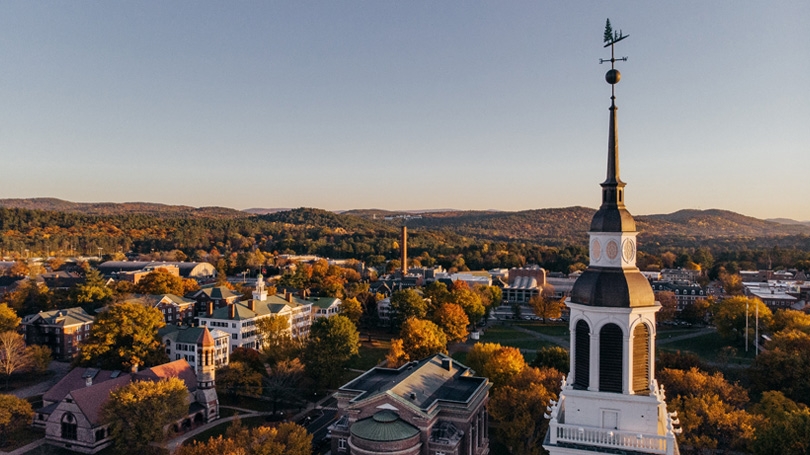
- About
- Board Members
- Governance
- News & Communications
Back to Top Nav
Back to Top Nav
Back to Top Nav
Decisions at the board's fall meeting will support academic excellence.
At their Nov. 7-9 meeting in Hanover, the Dartmouth Board of Trustees discussed projects and initiatives designed to strengthen the academic environment and ensure opportunities for future generations of students. They also honored faculty achievements.
"Dartmouth is on a strong upward trajectory," said President Philip J. Hanlon '77. "We see this in teaching and research, in the talent we attract to our campus, and most recently in our admission to the Association of American Universities. This affirmation from our university peers is the highest form of external recognition of our work. It is a testament to our faculty, who, in partnership with staff, students, and alumni, believe in what we can do as a community. Collectively, they are the stuff of this institution, and they are delivering."
The trustees hosted an annual dinner for newly tenured and promoted faculty at the Hood Museum of Arts on Friday. "For 250 years, Dartmouth faculty have been inspiring students, creating new knowledge, and addressing the most pressing issues of our time. Our students are incredibly fortunate to learn from them and work alongside them on campus and around the world," said board Chair Laurel Richie '81. Board members voted to extend Richie's term as chair for an additional year, through June 30, 2021.
Dean of the College Kathryn Lively provided an update on objectives, activities, and opportunities related to the House Communities. Lively talked about the strategic institutional objectives of the houses, which were announced as part of Moving Dartmouth Forward, launched by President Hanlon in 2015. The houses were created to promote intellectual engagement on campus, foster a stronger sense of community, and achieve continuity for undergraduates living on campus.
"A defining characteristic of the houses is the way they provide residential and social spaces for strengthened bonds among a diverse group of students and faculty," said Lively. "House communities are an important part of the Dartmouth experience because students are randomly assigned to the houses. This is one of the few times in which students are not self-selecting, and instead join people from different places and backgrounds. The arrangement is an integral part of a liberal arts education and important for the development of cultural literacy."
Trustees had dinner on Thursday with undergraduate and graduate students engaged in the communities to hear their perspectives and ideas on enriching programing and student interaction.
Vice President for Institutional Projects Joshua Keniston and Director of Sustainability Rosi Kerr '98 briefed board members about progress in the Dartmouth Green Energy Project, which is aimed at improving energy resiliency, sustainability, and efficiency. Through the project, Dartmouth is expanding its analysis of energy-generation options to heat the campus.
"It's important to have a productive and wide-ranging dialogue about how we can most effectively tackle this important and complex problem," said Kerr. "We are open to new ideas that can be implemented in our setting."
One of those new ideas is to determine the viability of using geoexchange heating and cooling systems in a pair of campus locations. This week, a well-drilling rig will be installed on the Green, and next month in the Dewey Field parking lot, to conduct geoexchange testing. Geoexchange systems, which are powered by electric heat pumps, use a series of closed-pipe loops set deep underground to use the stable ground temperature to heat in the winter and cool in the summer.
"If we find that large-scale geoexchange systems are a viable option for our campus, this could become part of a portfolio of solutions to meet our energy needs," said Keniston.
Members of the board heard about the need for additional library storage space from Dean of Libraries Sue Mehrer and Associate Vice President for Planning, Design, and Construction John Scherding. Board members approved spending $100,000 to complete design of a library collections and service facility to take the place of the existing facility on Etna Road in Lebanon. The new facility, estimated to cost $18.5 million, would address an urgent need for increased offsite storage and provide room for collection growth over the next 15 years.
The new space would house low-use physical collections and College records and allow for improvement of existing on-campus academic learning and scholarly research facilities in Berry Library. Construction would begin on the new facility in the summer or fall of 2020, pending permit approvals from the city of Lebanon.
Chief Financial Officer Michael Wagner led a discussion about the financial challenges, risks, and opportunities of the higher education business model. The session was designed to help trustees with their financial responsibilities. It is important to look to the future so that board members and the administration can take action now to prepare for the future, said Wagner.
During the trustees' visit, the women on the board hosted a luncheon with female undergraduate student leaders.